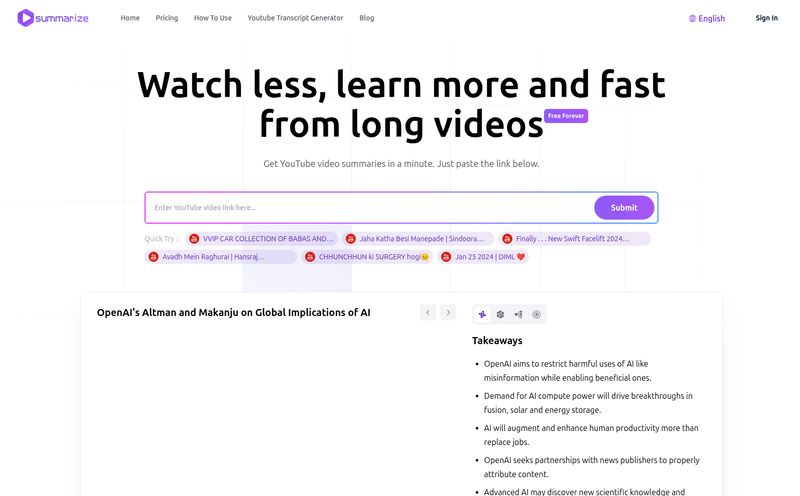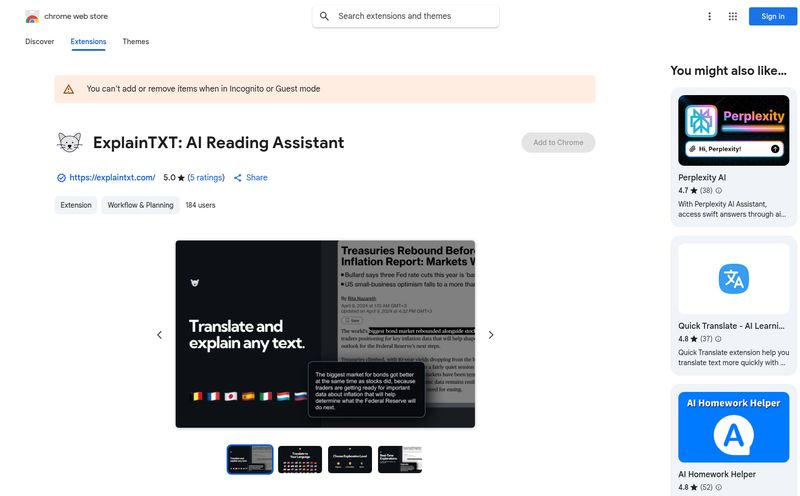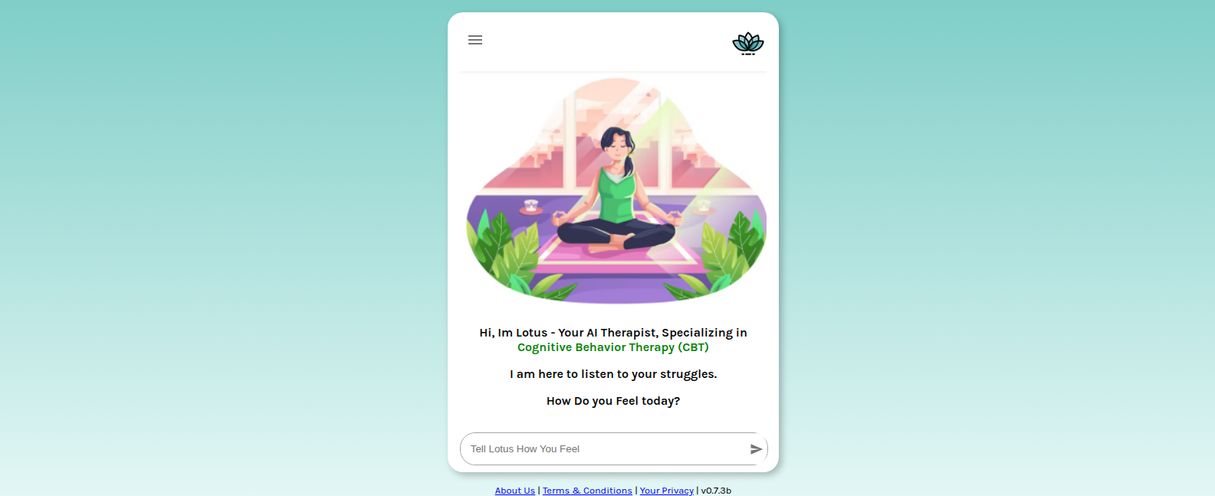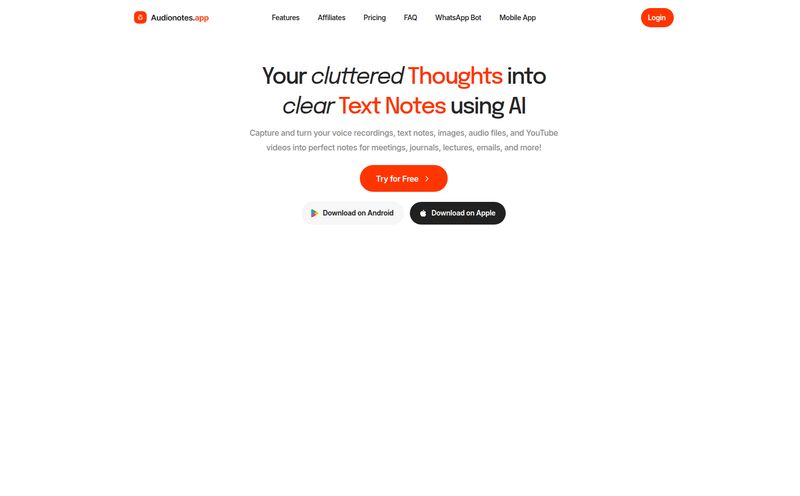You and me. If you’ve ever found yourself staring at a mountain of research papers, with 57 browser tabs open, each one a dense, jargon-filled PDF... you know the feeling. It's that slow-drip dread of the literature review. The process is a necessary evil, the foundation of great work, but man, can it be a soul-crushing slog. I've been there, fueled by questionable coffee at 2 AM, wondering if I'll ever see the light of day again.
For years, we've just accepted this as part of the grind. But now, the landscape is shifting. AI tools are popping up everywhere, each promising to be our savior. Some are just fancy search engines, others are little more than glorified summarizers. It's getting hard to tell the signal from the noise.
So when I stumbled upon Paper Pilot, with its bold claim of cutting research time by 74%, my inner SEO-skeptic raised an eyebrow. Another one? But then I looked closer. And I have to say, what I found was... intriguing. So, is this the real deal or just another piece of shiny tech? Let's get into it.
What in the World is Paper Pilot?
At its core, Paper Pilot is an AI-powered research productivity platform. Think of it less as a simple tool and more as a dedicated co-pilot for your research journey. Its whole reason for being is to take the most painful parts of academic research—finding papers, understanding them, organizing them, and citing them—and make them ridiculously simple. We're talking about sifting through a database of over 220 million academic papers. That's not a typo.
It’s built for anyone who lives and breathes this stuff: graduate students fighting with their thesis, academics trying to publish, R&D professionals in the corporate world, or even just insatiably curious people who want to understand complex topics without getting a PhD in the process.
The Core Features That Actually Matter
A platform is only as good as its features, right? Here’s a breakdown of what Paper Pilot brings to the table, and honestly, some of it feels like a bit of magic.
The AI Search and Quick Summary Combo
We've all used Google Scholar. It's great, but it's still a keyword-based game. Paper Pilot’s AI Search feels different. It's more about understanding your intent. You can ask it a question, and it doesn’t just find papers with those words; it finds papers that answer your question. That's a subtle but massive difference.
But the real one-two punch is the Quick Summary feature. Before you even open a PDF, you get a concise, AI-generated summary. This is the ultimate time-saver. No more reading half an abstract and the introduction just to realize the paper's methodology isn't relevant to you. You can qualify or disqualify sources in seconds, not minutes.
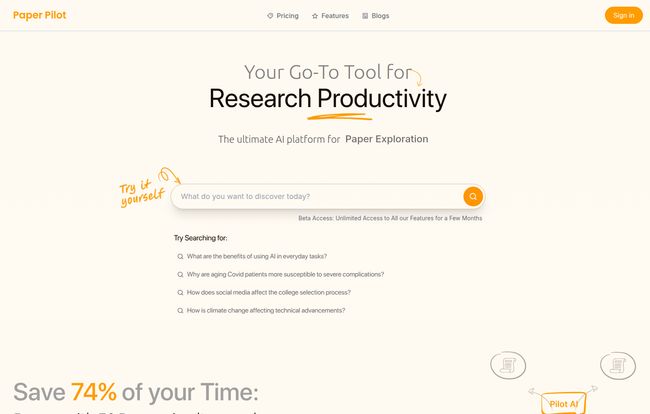
Visit Paper Pilot
The Interactive AI Assistant: Your Personal Research Intern
Okay, this is the showstopper. Paper Pilot claims you can “Chat & engage simultaneously with up to 50 Papers.” Let that sink in. You can upload a collection of papers to a ‘Research Board’ and then... talk to them. All at once.
Imagine asking, “What are the common limitations cited across all these studies on AI-driven CPC bidding?” and getting a synthesized answer drawn from all 50 sources, complete with citations. It’s like hosting a roundtable discussion with the authors themselves, except you don't have to provide snacks. This moves beyond simple search into genuine synthesis, which has always been the most time-consuming part of research for me.
Research Boards: Finally, Some Organized Chaos
My desktop during a research project usually looks like a digital disaster zone. PDFs with cryptic names, a Word doc full of random quotes, and a browser groaning under the weight of open tabs. Paper Pilot's Research Boards are the antidote to this madness. It’s like Pinterest or Trello, but designed specifically for research papers. You can pin papers, jot down notes, and see all your sources for a specific project in one clean, visual workspace. It’s a simple concept, but the execution is what makes it so valuable for keeping your thoughts—and your sources—straight.
The Big Question: Can It Really Save 74% of Your Time?
I’m always wary of big, flashy numbers. 74% is incredibly specific and sounds like a marketer's dream. But... I can actually see a path to it. Think about the cumulative effect. You save 10 minutes here by quickly discarding an irrelevant paper. You save an hour there by using the AI assistant to synthesize themes instead of doing it manually. You save another 30 minutes with auto-generated citations. It all adds up.
Will every single person save exactly 74% of their time? Probably not. Your mileage will certainly vary depending on your project's complexity. However, the potential to slash your research time in half seems not just possible, but likely. For me, that alone is a monumental win.
Let's Talk Money: The Paper Pilot Pricing Plans
So, what's the damage? The good news is there's a free entry point. The platform uses a pretty standard tiered model, which I've broken down below. They focus on annual billing, which gives you a better monthly rate.
| Plan | Price | Best For |
|---|---|---|
| Free Plan | $0 / Annual | Testing the waters and very light, occasional research. You'll feel the limits quickly. |
| Student Plan | $84 / Annual ($7/Month) | The sweet spot. Perfect for students, academics, and most individual researchers. |
| Pro Plan | $129 / Annual ($11/Month) | Power users, research teams, and those who need the advanced features like unlimited boards and potential access to paywalled papers. |
In my opinion, the Free plan is a perfect, no-risk way to see if the workflow clicks with you. But for any serious project, you’ll want to at least consider the Student plan. The jump to unlimited summaries and explanations is the real game changer there.
The Good, The Bad, and The Realistic
No tool is perfect. Let's be real. After playing around with Paper Pilot, here's my honest take.
What I'm Genuinely Excited About
The time savings are obviously the headline. But it’s the way it saves time that’s impressive. The interactive AI assistant is a genuinely innovative feature that sets it apart from competitors like Elicit. The organizational aspect of Research Boards is also a huge quality-of-life improvement. And I have to give them props for offering a functional free tier—it shows confidence in their product.
What Gives Me a Little Pause
First, the free plan is limited. That's business, I get it, but you'll hit that 20 summaries/month cap pretty fast. Second, the Pro plan's access to “premium/paywalled papers” comes with a big asterisk: “subject to availability.” This is the feature I'm most curious and skeptical about. How does it work? How reliable is it? If you're relying on that, you'd need to test it thoroughly. Also, the site mentions "Beta Access," which tells me the platform is still young. That’s not necessarily a bad thing—it means rapid development—but it could also mean the occasional bug or feature change. Its something to be aware off.
So, Should You Give Paper Pilot a Shot?
Here's my final verdict. If the phrase “literature review” makes you want to curl up in a ball and hide, then yes. Absolutely. You should sign up for the free plan right now.
Paper Pilot is a seriously powerful ally for anyone drowning in academic papers. For a PhD student, it could be the difference between finishing on time and pulling your hair out for another six months. For a marketing professional doing competitor research, it's a way to quickly get up to speed on industry trends. The tool is sharp, intelligently designed, and targets a very real, very widespread pain point.
It’s a strong contender in the growing field of AI research assistants, and its unique approach to synthesizing information across multiple documents makes it stand out. The question isn’t whether the tool is good—it is. The question is whether it fits your specific workflow. And there's only one way to find that out.
Frequently Asked Questions
- What is Paper Pilot in a nutshell?
- It's an AI-powered platform that helps you find, understand, organize, and cite research papers much faster. Its key feature is an AI assistant that can read and synthesize information from up to 50 papers at once.
- How do the Research Boards actually work?
- Think of them as project folders. You create a board for a specific topic (e.g., "Q3 SEO Trends"), add relevant papers to it, and then all your notes and AI chats about those papers are contained within that board. It keeps everything tidy.
- Can I share my research or collaborate with others?
- Yes, the platform mentions collaboration and the ability to share your Research Board with others, which is great for team projects or getting feedback from a supervisor.
- How reliable are the AI-generated summaries?
- In my experience, they are quite good for getting the gist of a paper. However, as with any AI, you should never treat it as an infallible replacement for critical thinking. It's a guide, not a gospel. Always cross-reference crucial details with the original text.
- How does Paper Pilot get access to paywalled articles?
- The platform isn't explicit about the mechanism, but this feature in similar tools often works by checking for open-access versions of the paper (like pre-prints on arXiv) or integrating with university library credentials. The "subject to availability" clause suggests it's not a guaranteed bypass of all paywalls.
- Can I pay monthly instead of annually?
- The pricing on their website is heavily geared towards annual plans to offer a lower effective monthly rate. While a monthly option might exist, the best value is clearly in the annual subscription.
Final Thoughts
We're living in a wild time for information. We have more access to knowledge than ever before, but we're also more overwhelmed. Tools like Paper Pilot aren't just about working faster; they're about working smarter. They're about clearing away the friction so we can get to the good stuff: the ideas, the insights, and the discoveries.
Paper Pilot is an exceptionally well-thought-out platform that tackles a problem many of us know all too well. If you're in the knowledge game, give it a look. What have you got to lose, other than a few dozen browser tabs and a whole lot of stress?
